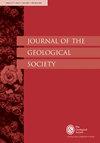格陵兰岛东北部晚侏罗世-早白垩世海洋脱氧
IF 3
3区 地球科学
Q2 GEOSCIENCES, MULTIDISCIPLINARY
引用次数: 0
摘要
上侏罗纪-下白垩纪间隔代表了一个漫长的海洋脱氧期,尤其是在北极盆地,其控制因素仍知之甚少。两个总长度>450 m的岩芯覆盖了格陵兰岛东北部沃拉斯顿-福兰进化的半地堑系统(盆地中心和下盘顶部附近)中对比位置的Kimmeridian-Barremian序列;它们为了解古环境发展和氧化还原条件在详细的构造地层学框架内的变化提供了一个长达~20英里的特殊窗口。包括沉积学、无机和先前发表的有机地球化学在内的多学科数据集的综合表明,尽管从Kimmeridian到梁系黑色泥岩连续堆积,但Kimmeridiian的海底缺氧是间歇性的,而更持久的缺氧/euxinia发生在Volgian中期至梁系早期。与格陵兰岛边缘同期序列的相关性表明,在侏罗纪-白垩纪过渡期间,长期的裂谷作用和局部海底地形的形成是海底脱氧和洋流漏斗和放大的主要驱动因素。因此,海流活动和缺氧、缺氧和缺氧的分布在空间上是不同的,允许完全氧化和缺氧袋共存。补充材料:[S1:岩相表,S2:地球化学数据摘要,S3:地球化学原始数据,S4:Store Koldewey的沉积学日志]可在https://doi.org/10.6084/m9.figshare.c.6442539本文章由计算机程序翻译,如有差异,请以英文原文为准。
Late Jurassic – Early Cretaceous marine deoxygenation in Northeast Greenland
The Upper Jurassic – Lower Cretaceous interval represents a prolonged marine deoxygenation period particularly in the Boreal–Arctic basins, the controlling factors of which remain poorly understood. Two drill cores totaling >450 m cover the Kimmeridgian–Barremian succession in contrasting locations in an evolving half-graben system (basin center and near the footwall crest) in Wollaston Forland, NE Greenland; they provide an exceptional ∼20 myr long window into paleoenvironmental development and changes in redox conditions within a detailed tectonostratigraphic framework. Synthesis of a multidisciplinary dataset including sedimentology, inorganic and previously published organic geochemistry indicates that, despite continuous black mudstone accumulation from the Kimmeridgian to the Ryazanian, sea floor anoxia was intermittent in the Kimmeridgian, whereas more sustained anoxia/euxinia occurred in the middle Volgian – early Ryazanian. Correlation to reported contemporaneous successions along the Greenland margin, indicate that protracted rifting and generation of localized sea-floor topography were among the major drivers both of sea-floor deoxygenation and current funneling and amplification during the Jurassic–Cretaceous transition. Consequently, distribution of seaway current activity and dysoxia, anoxia and euxinia varied spatially, allowing fully oxygenated and anoxic pockets to coexist.
Supplementary material:
[S1: Facies table, S2: Summary of geochemistry data, S3: Geochemistry raw data, S4: Sedimentological log from Store Koldewey] is available at
https://doi.org/10.6084/m9.figshare.c.6442539
求助全文
通过发布文献求助,成功后即可免费获取论文全文。
去求助
来源期刊

Journal of the Geological Society
地学-地球科学综合
CiteScore
6.00
自引率
3.70%
发文量
68
审稿时长
6-12 weeks
期刊介绍:
Journal of the Geological Society (JGS) is owned and published by the Geological Society of London.
JGS publishes topical, high-quality recent research across the full range of Earth Sciences. Papers are interdisciplinary in nature and emphasize the development of an understanding of fundamental geological processes. Broad interest articles that refer to regional studies, but which extend beyond their geographical context are also welcomed.
Each year JGS presents the ‘JGS Early Career Award'' for papers published in the journal, which rewards the writing of well-written, exciting papers from early career geologists.
The journal publishes research and invited review articles, discussion papers and thematic sets.
 求助内容:
求助内容: 应助结果提醒方式:
应助结果提醒方式:


